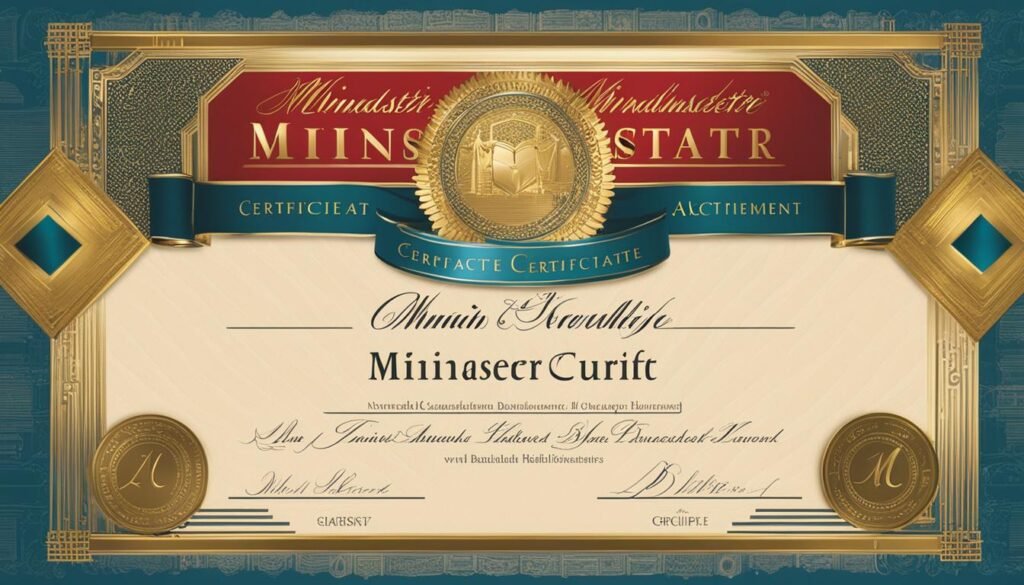Welcome to our guidebook on MiniMaster Certificates, a post-bachelor credential that can pave the way for your career advancement. In this guide, we will explore what MiniMaster Certificates are, their benefits, how to earn them, and the rise of these credentials in the higher education landscape. Join us on this journey and discover how MiniMaster Certificates can help you enhance your skills and open doors to exciting opportunities.
Key Takeaways:
- MiniMaster Certificates are a valuable post-bachelor credential option for career advancement.
- These certificates offer a flexible and cost-effective way to gain specific skills and knowledge.
- MiniMaster Certificates are recognized by employers and can enhance career prospects.
- Earning a MiniMaster Certificate does not guarantee admission to a master’s degree program.
- The demand for MiniMaster Certificates is growing, driven by the need for short-form education options and skills development.
What are MiniMaster Certificates?
MiniMaster Certificates are educational credentials that provide individuals with an opportunity to gain specialized knowledge and skills in a shorter time frame than a traditional degree. These certificates are typically offered as part of a career-focused program and can be earned by completing a series of graduate-level courses in a specific field. MiniMaster Certificates are designed to be highly relevant to real job requirements and are recognized by employers for their practicality and applicability.
These certificates can be obtained through various entities, including training providers, professional associations, companies, and colleges and universities. In the context of higher education institutions, MiniMaster Certificates are typically offered as a flexible and convenient option for individuals who want to enhance their career prospects without committing to a full master’s degree program.
Benefits of MiniMaster Certificates:
- MiniMaster Certificates offer specialized knowledge and skills in a specific career field.
- These certificates are recognized by employers for their real job relevance.
- MiniMaster programs provide a more cost-effective and time-efficient path to career advancement compared to traditional master’s degree programs.
- By earning a MiniMaster Certificate, individuals can enhance their competitiveness in the job market.
Overall, MiniMaster Certificates provide individuals with an opportunity to gain focused expertise in a specific career field, making them an attractive option for those looking to advance their careers.
The Benefits of MiniMaster Certificates
MiniMaster Certificates offer several benefits to individuals seeking career advancement. Firstly, they provide a pathway to acquire new skills and knowledge in a specific career field. These certificates are designed to be relevant to real job requirements and are recognized by employers. By earning a MiniMaster Certificate, individuals can demonstrate their expertise and competency, making them more competitive in the job market.
Additionally, these certificates can be a cost-effective way to advance one’s education, as they are typically less expensive and time-consuming compared to traditional master’s degree programs. MiniMaster Certificates offer focused and specialized learning opportunities, allowing individuals to gain deep knowledge in their chosen field of study. This targeted learning approach can enhance job performance and open up new career opportunities.
Benefits of MiniMaster Certificates:
- Acquisition of new skills and knowledge
- Relevance to real job requirements
- Recognition by employers
- Demonstration of expertise and competency
- Cost-effective education option
- Less time-consuming compared to traditional master’s degree programs
- Focused and specialized learning opportunities
- Enhancement of job performance
- Opening up new career opportunities

Overall, MiniMaster Certificates provide individuals with the opportunity to advance their careers by acquiring specialized knowledge and demonstrating their expertise. These credentials are highly regarded by employers and offer a cost-effective and efficient way to enhance one’s education. Whether individuals are looking to gain a competitive edge in the job market or seeking to switch careers, MiniMaster Certificates can play a valuable role in their professional development.
How to Earn a MiniMaster Certificate
Earning a MiniMaster Certificate consists of completing a series of courses in a specific field. These courses can typically be taken online, offering flexibility in terms of pace and location. The convenience of online learning allows individuals to fit their studies into their busy schedules and learn at their own pace.
Upon successfully completing the required courses, individuals are awarded the MiniMaster Certificate, a recognition of their mastery of the subject matter. These certificates provide tangible evidence of the skills and knowledge acquired, which can be showcased on resumes and LinkedIn profiles to enhance career prospects.
For those considering further education, the credits earned through a MiniMaster program may be transferable towards a full master’s degree program. However, it is important to note that credit transfer policies vary across universities, and acceptance is determined by each institution. Therefore, individuals interested in pursuing a master’s degree should research and consult with their chosen university to determine the credit transfer options available.
The benefits of earning a MiniMaster Certificate include:
- Gaining in-depth knowledge and skills in a specific career field
- Enhancing career prospects and competitiveness in the job market
- Flexible online learning options
- Potential credit transfer towards a master’s degree

The Rise of MiniMaster Certificates
MiniMaster Certificates have gained significant popularity in recent years due to various factors and market demands. The higher education landscape has seen a rise in the adoption of these innovative credentials as individuals seek flexible and targeted learning options to advance their careers.
One of the key drivers behind the rise of MiniMaster Certificates is the growing demand for short-form education. With the fast-paced nature of the job market, many working professionals and adult learners are looking for opportunities to upskill or reskill quickly and efficiently. MiniMaster Certificates provide a focused and specialized curriculum that aligns with the evolving needs of industries and employers.
Additionally, the rise of online learning has also contributed to the popularity of MiniMaster Certificates. These credentials can be earned through digital platforms, which offer convenience and accessibility for learners from all over the world. The COVID-19 pandemic further accelerated the shift towards online education, making MiniMaster Certificates even more attractive as individuals seek career development opportunities from the comfort of their homes.
Benefits of MiniMaster Certificates
- Flexible and targeted learning options
- Recognition by employers
- Cost-effective compared to traditional master’s degrees
- Opportunity to gain relevant skills and knowledge
The rise of MiniMaster Certificates reflects the changing landscape of higher education and the need for innovative and accessible learning opportunities. As colleges and universities continue to adapt to market demands, individuals can benefit from these credentials to enhance their professional growth and meet the evolving needs of the job market.

Challenges and Opportunities of MiniMaster Certificates
While MiniMaster Certificates offer numerous opportunities for career advancement, there are also challenges that need to be addressed. One of the challenges is the alignment of offerings across different educational institutions. With the wide variety of MiniMaster programs available, ensuring consistency and recognition of these certificates can be a hurdle. It is essential to establish clear guidelines and standards to maintain the quality and value of MiniMaster Certificates across the board.
Challenges:
- Alignment of offerings across different institutions
- Standardization and recognition of MiniMaster Certificates
- Ensuring consistency and quality
Another challenge is the availability of financial aid options for individuals pursuing MiniMaster Certificates. Unlike traditional degree programs, financial aid options can be limited for non-degree credential seekers. This can create barriers for individuals who may not have the financial means to pursue these valuable credentials. Universities and educational institutions can address this challenge by developing innovative and accessible financing options specifically tailored to support MiniMaster Certificate aspirants.
Opportunities:
- Strategic partnerships and collaborations to expand financial aid options
- Development of innovative financing models
- Increased accessibility and affordability for individuals
Addressing these challenges presents opportunities for universities and educational institutions to further enhance the value and accessibility of MiniMaster Certificates. By proactively working towards the alignment of offerings and expanding financial aid options, institutions can ensure that MiniMaster Certificates become a widely recognized and accessible pathway for career advancement.

Conclusion
MiniMaster Certificates are a valuable option for individuals seeking career advancement and post-bachelor credentials. These certificates offer a flexible and cost-effective way to acquire new skills and knowledge in a specific career field. With their real job relevance and recognition by employers, MiniMaster Certificates can significantly enhance career prospects for individuals.
While challenges exist in terms of standardization and financial aid availability, the growing demand for MiniMaster Certificates presents exciting opportunities for both institutions and individuals. Colleges and universities can develop strategic partnerships and innovative financing options to make these credentials more accessible and affordable. By pursuing MiniMaster Certificates, individuals can navigate their post-graduate career paths with confidence and stay ahead in the competitive job market.
Whether you’re looking to enhance your skills or gain a competitive edge, consider exploring the diverse range of MiniMaster Certificates available. These post-bachelor credentials can open doors to new opportunities and pave the way for career growth. Invest in your future by earning a MiniMaster Certificate and unlock your full potential in the professional world.
FAQ
What are MiniMaster Certificates?
MiniMaster Certificates are post-bachelor credentials that offer deep learning in a specific career field. They are recognized by employers for their real job relevance and can be obtained through a series of graduate-level courses offered by top universities.
What are the benefits of MiniMaster Certificates?
MiniMaster Certificates provide a pathway to acquire new skills and knowledge in a specific career field. They are recognized by employers, making individuals more competitive in the job market. Additionally, they are cost-effective compared to traditional master’s degree programs.
How can I earn a MiniMaster Certificate?
To earn a MiniMaster Certificate, individuals need to complete a series of courses in a specific field. These courses can be taken online and offer flexibility in terms of pace and location. Upon successful completion, individuals are awarded the MiniMaster Certificate.
What is the rise of MiniMaster Certificates?
MiniMaster Certificates have gained significant popularity due to the growing demand for short-form education options, the rise of online learning, and the need for skills development in the job market. The COVID-19 pandemic has further accelerated the demand for these certificates.
What are the challenges and opportunities of MiniMaster Certificates?
Challenges include the alignment and recognition of offerings across different educational institutions and the availability of financial aid options. However, these challenges present opportunities for universities to develop partnerships and innovative financing options to make MiniMaster Certificates more accessible and affordable.
Source Links
- https://www.edx.org/masters/micromasters
- https://cps.northeastern.edu/wp-content/uploads/2023/05/Microcredentials_Primer_HigherEd.pdf
- https://s3.amazonaws.com/media.guidebook.com/upload/135803/qwbOVtydvYNAyv8th0RX0HPf2kdyoDWTtnEA.pdf


